|

| |
 |
|
|
SB-18
Highlights,
Thursday, June 5th
Delegates
to the Eighteenth Sessions of the Subsidiary Bodies of the UNFCCC
(SB-18) convened in morning SBI and afternoon SBSTA sessions.
Contact groups met to consider the IPCC Third Assessment Report
(TAR), sinks in the CDM, arrangements for intergovernmental
meetings, and Research & Systematic Observation. |
|
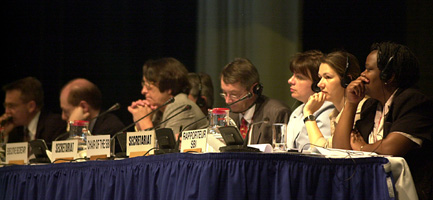 SBI
panel members, morning plenary
SBI
panel members, morning plenary
|
|
SBI
The SBI
considered: administrative and financial matters, arrangements
for intergovernmental meetings, and non-Annex I financial matters.
ORGANIZATIONAL MATTERS: Chair Stoycheva said Parties agreed
to consider the issue of non-Annex I national communications
under other matters, and the SBI adopted the agenda without
amendment.
Listen to Chair Daniela Stoycheva
|
|
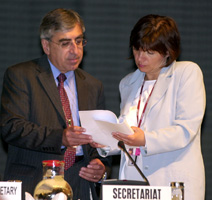
SBI
Chair Daniela Stoycheva and SBI coordinator Luiz Gomez-Echeverri
|
|
ADMINISTRATIVE
AND FINANCIAL MATTERS: Parties heard remaining statements
on the programme and budget for the biennium 2004-2005. JAPAN
said conference services should be funded from the UN regular
budget. The EU indicated that the budget should be more predictable
and sustainable for future periods, and expressed surprise
over the distinction between the Protocol and UNFCCC activities
in the budget. AUSTRALIA emphasized that budget priorities
need to be clarified, and, with BRAZIL, CHINA, the EU, JAPAN,
NORWAY, and RUSSIAN FEDERATION, said the budget increase is
too high. The RUSSIAN FEDERATION favored a zero growth budget,
but would accept budget increases for inflation, and requested
clear indication of how its contribution to the budget would
be affected by its ratification of the Protocol.
|
ARRANGEMENTS
FOR INTERGOVERNMENTAL MEETINGS:
Listen
to the Secretariat's introduction of this item
The Secretariat
highlighted, inter alia, two scenarios for the programme of
work: one for COP-9 and, in the event of entry into force
of the Protocol, another for COP/MOP-1 to be convened in conjunction
with COP-9.
On the organization of the COP's work, the US, with others,
supported convening high-level round tables. AUSTRALIA said
COP-9 should build on the Delhi Declaration on Climate Change
and Sustainable Development.
|
|
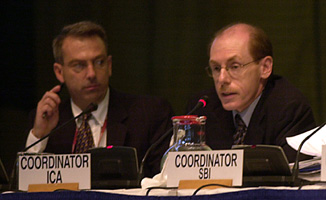
Richard
Kinley, Secretary of the COP (right) |
|
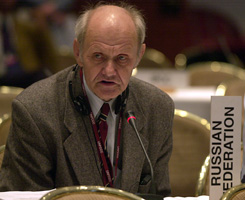 Russia
Russia
|
|
NORWAY
and BURKINA FASO supported holding the high-level ministerial
segment at the end of each session, while the US, BRAZIL and
SAUDI ARABIA supported holding it at the beginning of the
sessions. Several delegates underscored the need to separate
work on the UNFCCC and the Protocol. The US, with AUSTRALIA,
SLOVENIA, NORWAY, and CANADA, supported the consideration
of a multi-year work programme, and the streamlining of each
session's agenda. On effective participation, the US objected
to the manner in which the CDM Executive Board was implementing
the rules relating to the participation of observers. The
G-77/CHINA, with SAUDI ARABIA, BURKINA FASO, and the EU, called
for increased funding for the participation of delegates from
developing countries. Several delegations called for a systematic
approach to ensure broad and balanced participation in all
bodies, expert groups and workshops. Chair Stoycheva said
that a contact group chaired by Karsten Sach (Germany) would
facilitate further discussion on these issues.
|
|
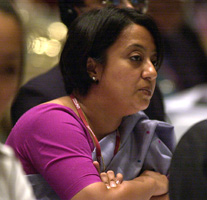
India
intervenes on behalf the G-77/China
|
|
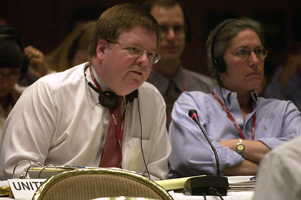
Dan Reifsnyder Susan Biniaz, US
|
|
 Listen
to: Listen
to:
|
|
POLICIES
AND MEASURES: Chair Thorgeirsson recalled that implementing
decision 13/CP.7 (P&Ms) could include two pathways: strengthening
web-based approaches for exchanging information, and engaging
in further methodological work to develop and assess P&Ms.
In the context of national circumstances, several delegates
said that information exchange has been valuable in highlighting
the effectiveness of P&Ms.
Listen
to SBSTA Chair

|
|
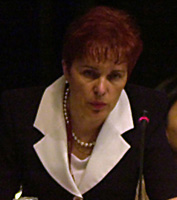
Secretariat
|
|
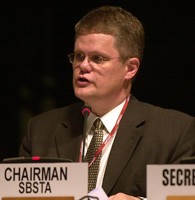
SBSTA
Chair Halldor Thorgeirsson
|
| SWITZERLAND,
with AUSTRALIA and CANADA, supported a standing agenda item
on this issue and invited non-Annex I Parties to benefit from
information sharing. SAUDI ARABIA said that discussions should
be limited to Annex I Parties. The EU called for additional
workshops and web-based tools. JAPAN, with AUSTRALIA, said
that P&Ms should be self-assessed. Chair Thorgeirsson
said Greg Terrill (Australia) and Richard Muyungi (Tanzania)
would co-chair consultations on this item and prepare SBSTA
conclusions and a draft COP decision.
|
|
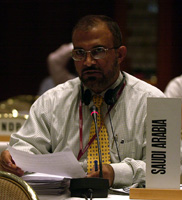
Saudia
Arabia
|
|
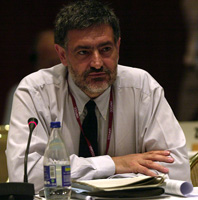
Jose
Romero, Switzerland
|
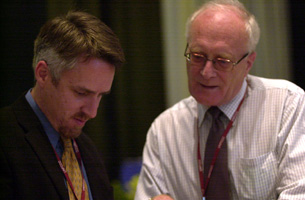
Australia
and Norway
|
|
 Listen
to: Listen
to:
|
|
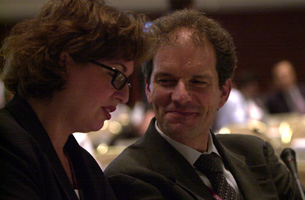
Paul
Fauteux, Canada
|
|
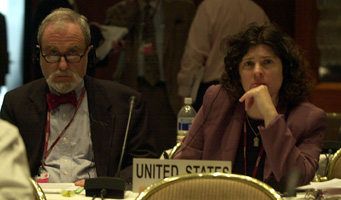
Elmer Holt and
Susan Wickwire, United
States
|
|
|
|
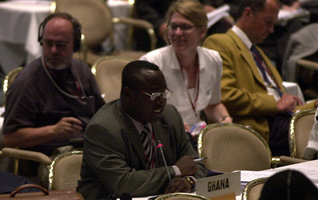
William
Kojo Agyemang-Bonsu, Ghana reports on the EGTT with German
delegates in the background |
|
TECHNOLOGY
TRANSFER: William Agyemang-Bonsu (Ghana) reported on the
work of the Expert Group on Technology Transfer (EGTT).
Delegates commended progress made by the EGTT and highlighted
the need for broad stakeholder participation in creating
enabling environments for technology transfer; transparency
in creating enabling environments; concrete actions to implement
the outcomes of the EGTT and the technology assessments;
and attention to the broader issue of technology development.
 Listen
to: Listen
to:
|
|
|

|

